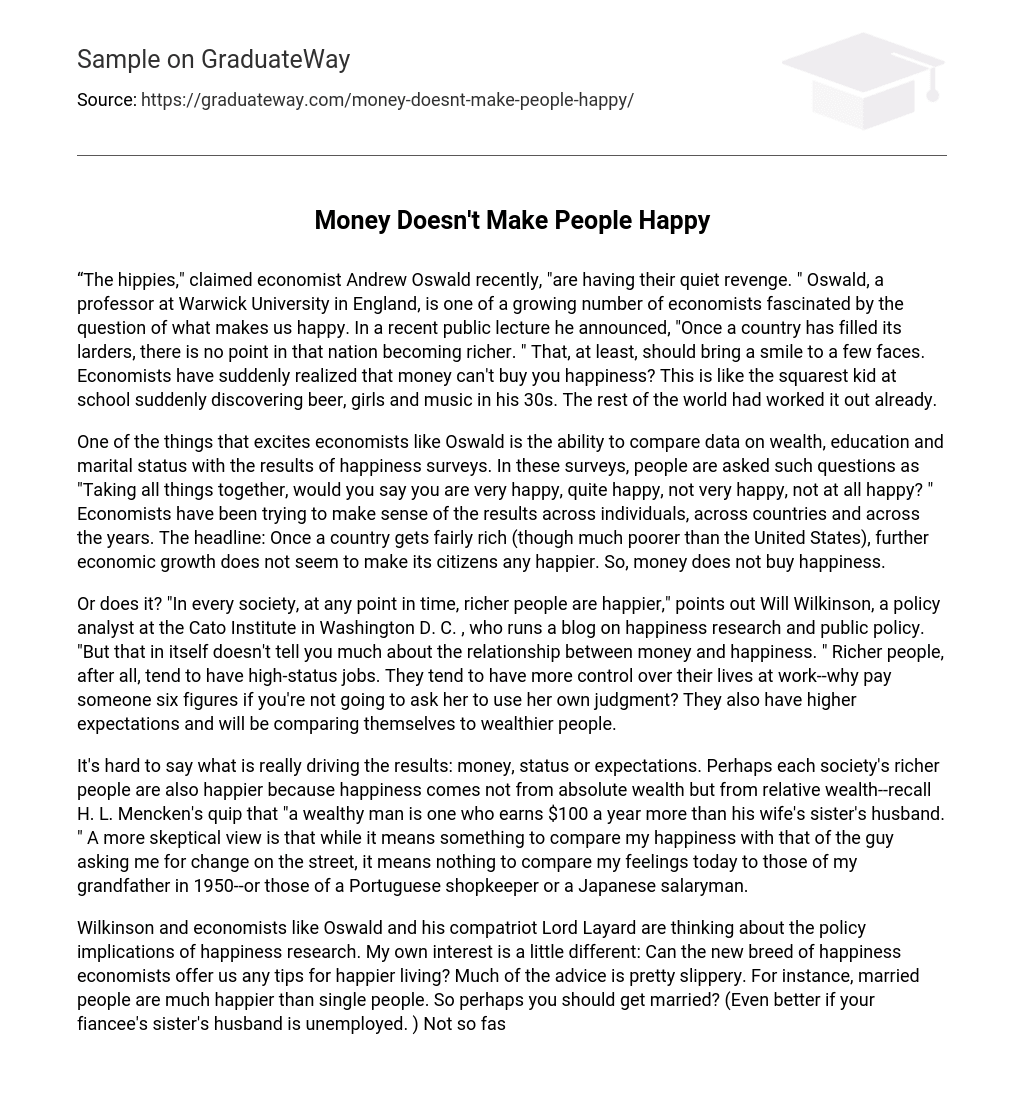Economist Andrew Oswald, a professor at Warwick University in England, recently asserted that “The hippies are having their quiet revenge.” Oswald is part of a growing group of economists intrigued by studying the factors that affect happiness. In a recent public lecture, he contended that after a country reaches an adequate level of resources, accumulating more wealth becomes pointless. This declaration might bring delight to some individuals. Is it conceivable that economists have finally comprehended that money cannot purchase happiness? It feels akin to the most naive person in school abruptly discovering the joys of beer, girls, and music in their thirties – when everyone else had already grasped it.
Economists find it fascinating to compare wealth, education, and marital status data with happiness survey findings. These surveys involve asking individuals questions such as “Overall, how happy would you say you are? Very happy, quite happy, not very happy, not at all happy?” Economists have been trying to interpret the results across individuals, countries, and over time. The main finding is that once a country reaches a relatively high level of wealth (though lower than that of the United States), further economic growth does not seem to increase happiness among its citizens. Therefore, it can be concluded that money does not bring happiness.
Will Wilkinson, a policy analyst at the Cato Institute in Washington D.C. and a blogger on happiness research and public policy, suggests that individuals with more wealth generally experience higher levels of happiness within a society.
Yet, this viewpoint overlooks the complete relationship between money and happiness. Other factors to consider include having prestigious occupations, enjoying increased work autonomy, having higher expectations, and comparing oneself to wealthier peers – all of which are commonly found among affluent individuals.
Determining the exact factors influencing the results, such as money, social status, or expectations, is challenging. It could be that individuals who are wealthier in each society experience higher levels of happiness not because of their absolute wealth but rather in comparison to others. H. L. Mencken’s humorous statement supports this notion by suggesting that a wealthy person is someone who earns slightly more money than their wife’s sister’s husband. However, from a skeptical standpoint, comparing my current level of happiness to that of someone asking for spare change might hold some meaning, whereas comparing my emotions today to those experienced by my grandfather in 1950 or individuals like a Portuguese shopkeeper or Japanese salaryman may lack significance.
Wilkinson, along with economists like Oswald and Lord Layard, are examining the policy implications of happiness research. However, my interest veers slightly: Can happiness economists offer any advice for a more content life? The guidance provided might be somewhat unclear. For instance, those who are married tend to experience greater happiness compared to single individuals. This implies that getting married could potentially lead to increased happiness (especially if the spouse’s sibling’s husband is unemployed). Nevertheless, it is crucial not to make hasty assumptions. More comprehensive surveys reveal that causation operates in both directions: Happy people have a higher likelihood of finding partners, while those grappling with depression may encounter difficulties in this area.
Marriage can bring either happiness or extreme unhappiness to individuals. As an economist, I cannot offer advice on whether you should propose to your partner. Oswald’s research suggests that divorce can actually lead to increased happiness compared to the period just before it. Oswald also recommends considering self-employment, as long as it does not result in financial setbacks. The attributes commonly associated with self-employment, such as independence and autonomy, are also connected to happiness.
Both Oswald and Richard Layard argue that relationships hold more importance than money, including professional relationships. In an interview, Lord Layard emphasizes the importance of treating colleagues with kindness and adhering to traditional values. It is also beneficial to focus on appreciating what you already have instead of obsessing over material possessions, relationships, and personal strengths that may be lacking.
In the field of economics, it is not efficient to attempt fixing things that are not your comparative advantage. A spiritual approach to this concept is suggested by an economist. Oswald also presents another solution – if one is feeling depressed, why not simply wait? There exists a happiness curve that portrays how happiness changes over time, resembling the shape of the letter J. The unhappiest phase in a person’s life tends to occur during their late 30s; however, as they grow older, happiness increases. Hence, life truly begins again at the age of 40. An invaluable study carried out by Danny Kahneman, an esteemed economist and the sole psychologist to have received a Nobel Prize in economics, offers further insightful findings. Around 1,000 employed women in Texas were asked by Kahneman to reflect on their previous day and record various episodes along with their corresponding activities and emotions. The results uncovered some predictable outcomes such as work being unpleasant and commuting being even more unpleasant. However, there were also some less apparent discoveries.
Praying is an enjoyable activity, while taking care of children can be less pleasurable. Spending time with friends brings great satisfaction, but spending time with a spouse only provides contentment. Interestingly, it seems that parents or other relatives make better companions than the supposed love of your life. However, it is evident that socializing with anyone other than your boss elicits positive emotions. Sex remains the ultimate source of pleasure and this advice proves to be useful. Yet, what if you engage in a sexual relationship with your boss? In such a circumstance, economists cannot offer guidance and silence must prevail. Tim Harford, an author and columnist for the Financial Times, authored The Undercover Economist.





